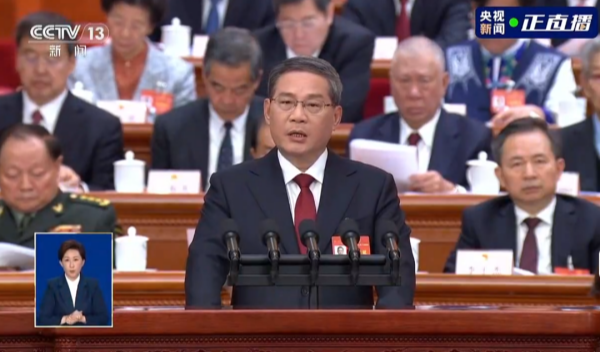Beijing sets growth at 5 per cent (without answering too many questions)
The traditional premier’s press conference has been cancelled. Addressing the Two Sessions, Premier Li Qiang reiterated the government’s plans, despite the pessimistic outlook by the International Monetary Fund. The real estate crisis and local government debt have halted infrastructure projects in 12 provinces. Meanwhile, Xi Jinping's purges continue in the Party.
Beijing (AsiaNews/Agencies) – China has set as its goal a 5 per cent GDP growth this year, the same as last year. This includes keeping the inflation at 3 per cent and creating more than 12 million new jobs in the cities, to keep the urban unemployment rate at 5.5 per cent.
Premier Li Qiang pledged these objectives this morning in his opening address to the National People's Congress (NPC). Together with the Chinese People's Political Consultative Conference (CPPCC), the NPC constitute the Two Sessions, a collective term for the annual political gathering that brings thousands of delegates to Beijing.
This year’s joint meeting opened in a climate of uncertainty precisely because of clouds gathering over China’s economy.
In this situation, Chinese President Xi Jinping wants to prevent any form of public dissent. To this end, security in the capital Beijing has been tightened, while reporters still have to undergo COVID-19 testing to have access to the various venues.
Above all, Premier Li Qiang will not hold the traditional press conference, which marked the end of the Two Sessions for the past 30 years.
“Barring exceptional circumstances, premier press conferences will not be scheduled during subsequent years of the 14th NPC,” said NPC spokesperson Lou Qinjian.
Meanwhile, analysts estimate that projected growth for 2024 will fall below the target Li Qiang announced.
The International Monetary Fund in February estimated it at less than 4 per cent. According to China's own official data, half of the country’s provinces have not met their growth target.
The crisis in the real estate sector and local government debt are the main causes of the economic slowdown.
China's central government has put on hold infrastructure projects in 12 provinces to prevent a further worsening the debt crisis.
An ageing population, reduced consumption, and unemployment are a drag on growth. Reports indicate that the retirement age in China might be raised to 65.
Meanwhile, purges among senior officials continue. Former Foreign Minister Qin Gang and Defence Minister Li Shangfu have been missing without any official explanation.
Some prominent leaders of the People's Liberation Army have also disappeared, while the rumour mills point to ongoing corruption probes in the Armed Forces.
Last week, the NPC announced that it had accepted Qin Gang's resignation, while the NPC spokesman confirmed that Li Shangfu would not attend the Two Sessions.
Those who have disappeared are all Xi loyalists.
In addition, there is still no news of the date for the third plenum of the 20th Central Committee of the Communist Party of China (CPC), which should have taken place in the autumn of last year.
This is an important moment because the important decisions such as development plans, personnel changes, appointments, and resignations are made by the CPC, while the NPC simply ratifies whatever the party puts on the agenda.
One thing that is clear is that national security remains a priority.
Last year, China amended its anti-espionage law, impacting the level of confidence foreign companies have in the country; as a result, foreign direct investment fell by 13.7 per cent.
Despite this, the NPC has encouraged Hong Kong to move forward with its own security legislation.
For his part, Premier Li Qiang confirmed military spending will rise by 7.2 per cent, the same figure as in 2023.







.png)










